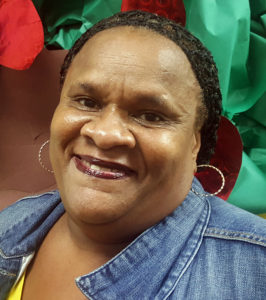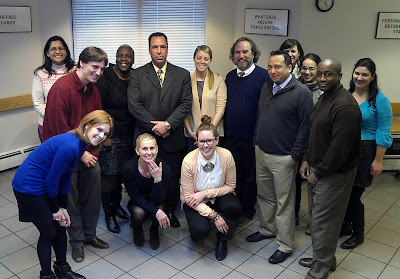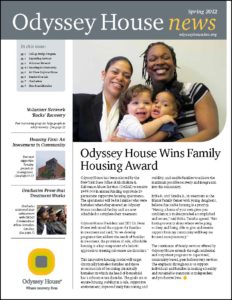Bronx Free Press Reporter Gregg McQueen visited our outpatient clinic in the Bronx to speak with Mary Callahan, senior manager, director of Outpatient Services, and Michael Everett, a certified recovery coach, about this innovative program and how it will help reduce recidivism in participants.
An innovative new program based in part in the Bronx looks to help parolees return to the community after incarceration and lower their risk of relapsing into criminal behavior.
Powered by a $300,000 grant from the U.S. Department of Justice, local nonprofit Odyssey House will implement a pre- and post-release mentoring and recovery program for parolees from the Edgecombe Correctional Facility.
Dubbed the Edgecombe Peer Monitoring Program (EPMP), the initiative provides services for the formerly incarcerated to help them transition from prison to community living.
It will also help parolees maintain sobriety, as an estimated 80 percent of state prison inmates have histories of drug or alcohol abuse.
“This type of program we’re doing is very rare,” said Mary Callahan, Director of Outpatient Services for Odyssey House. “But I would say it’s the face of treatment and recovery for the future.”

Following release from Edgecombe, parolees will be paired with a “coach” at Odyssey House’s outpatient facility on Southern Boulevard in the Bronx, who they’ll meet with twice weekly to review recovery goals, receive substance abuse counseling and get connected with vital services.
Coaches will ensure that parolees follow through on appointments, and assist them with finding housing, job training, medical and mental health services and going back to school, as well as efforts to maintain sobriety.
The first few years after incarceration are a critical period when many inmates are at risk of relapse, said Callahan.
Approximately two-thirds of offenders in re-entry are arrested again within three years of release, with 52 percent returning to prison for a technical violation or a new crime.
Callahan said that individuals frequently receive treatment for substance abuse while in prison, but are often on their own once released to the community.
“This grant will pick up that part of things by linking people with coaches, who act like mentors, so when they leave prison they’ll still be getting the support they need,” she commented.
Participants in EPMP will be issued texting-enabled cell phones, so they can check in with each other routinely.
“We’ve found texting to be very successful with our other programs,” said Callahan. “Parolees will have 24/7 access to their mentor.”
The EPMP will launch in February and is expected to serve 200 parole clients over the next two years.
“And once they’re plugged into the strong recovery network we have here, parolees will still have the support they need once our grant ends,” said Callahan.
The certified recovery coaches employed by Odyssey House for EPMP are all in recovery from substance abuse and were previously incarcerated themselves, Callahan added.
“They can definitely speak more directly to the parolee and relate to them better,” she commented.
The EPMP builds off a program that Odyssey House currently sponsors at Edgecombe, which houses previously incarcerated males who have violated parole and also have a documented substance abuse issue.
Men are assigned to the facility for 45 days — during their entire stay, Odyssey House provides them with an intensive treatment program to help them overcome addiction.
Since Odyssey House began working with Edgecombe in 2008, more than 3,600 inmates have participated in the treatment program designed to reduce recidivism and substance abuse.
Callahan said that addressing the parolees’ sobriety issue is essential before they can accomplish anything else in the community.
“That’s really the foundation of everything,” she remarked. “When you’re dependent on drugs or alcohol, you’re less likely to find employment, continue schooling or stay out of jail.”
Michael Everett would agree.
Everett, now a Certified Recovery Coach with Odyssey House, fought his own past battles with addiction and served several prison stints.
“I only wanted to get high,” he recalled. “When I’d get out of jail, I’d go right back to smoking and selling drugs and robbing people.”

Everett recently celebrated five years of sobriety and has been out of the prison system for 14 years.
Now, he has devoted himself to aiding others who are living through the same experiences.
“I didn’t have a program like this to help me when I got out of jail — I felt lost,” said Everett.
At Odyssey House, Everett has been helping to mentor young recovering addicts, some with a history of incarceration.
“Some people don’t even know how to apply to a school or who to turn to,” remarked Everett. “It’s about them making that transition back to accomplishing something positive.”
Callahan said that connecting parolees with housing is a major issue facing Odyssey House, as many individuals on parole have family members who reside in public housing.
“People on parole, they’re not permitted by law to live in public housing,” explained Callahan. “So, if that’s where their family lives, they can’t even go home to their family when they’re out of prison.”
Parolees will often end up in shelters, where they might reside with individuals who are not helpful to their recovery goals.
“A lot of times the shelters set them up to fail,” said Callahan. “There are a lot of barriers that these individuals face.”
Everett knows first-hand about these struggles. Now his role is to make his clients believe they can overcome them.
“I keep hope alive for these individuals,” remarked Everett. “Once they get to a place where they feel they can accomplish one positive thing, it’s a big deal.”
Recovery coach Everett recently completed a 350-hour training course to become a substance abuse counselor. Once he completes his internship hours, he’ll be able to get a job in that field.
“The sky is the limit for me now,” said Everett. “I’m not looking back, I’m only looking forward.”


 In 2014, Sheryl, 53, was early in her recovery. She had recently completed a rehabilitation program and, though she felt good about her new life, she knew from past experiences that she needed the support of peers who understand the complexities that come from struggling with an addiction for over 30 years. As an older adult who had been addicted to crack cocaine for so long, Sheryl felt that the challenges she faced were unique and needed to be treated as such.
In 2014, Sheryl, 53, was early in her recovery. She had recently completed a rehabilitation program and, though she felt good about her new life, she knew from past experiences that she needed the support of peers who understand the complexities that come from struggling with an addiction for over 30 years. As an older adult who had been addicted to crack cocaine for so long, Sheryl felt that the challenges she faced were unique and needed to be treated as such.


